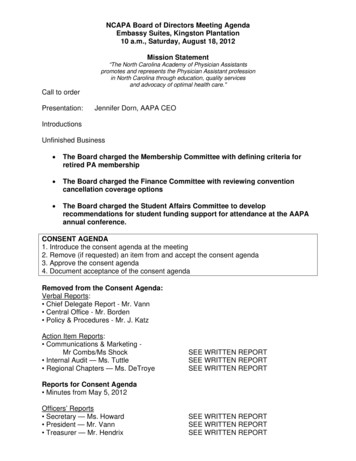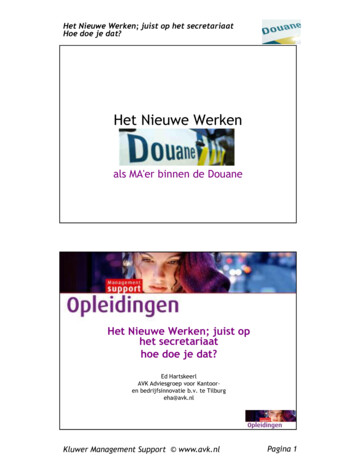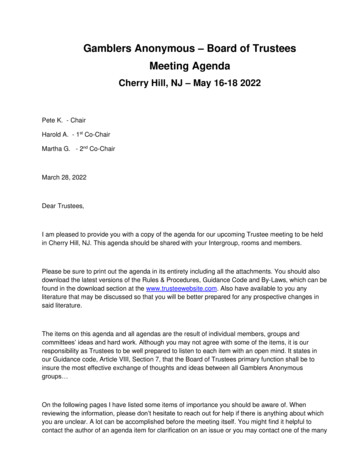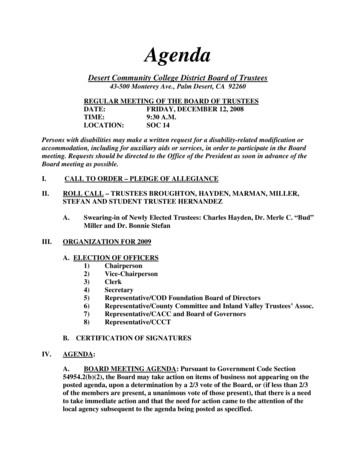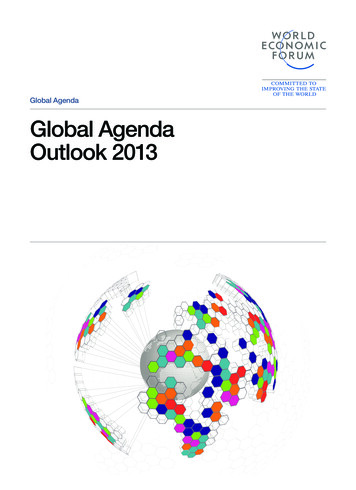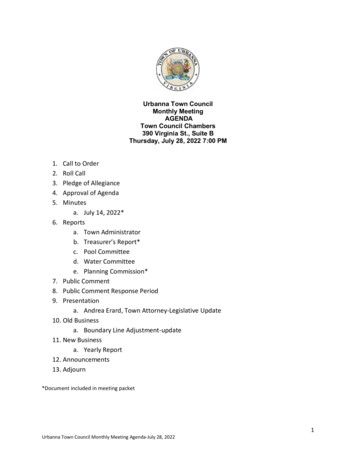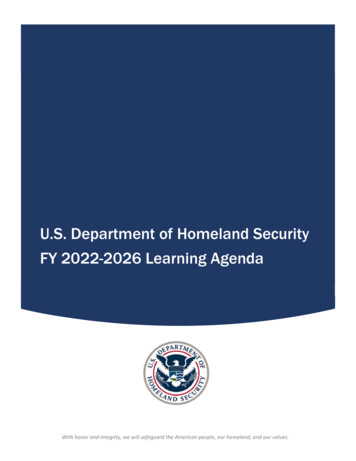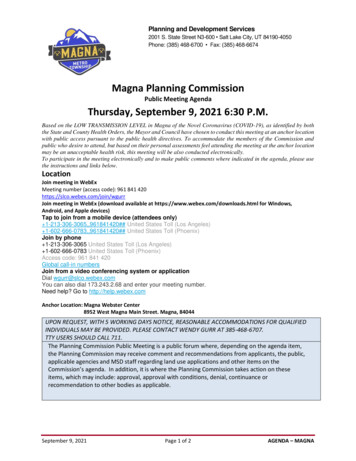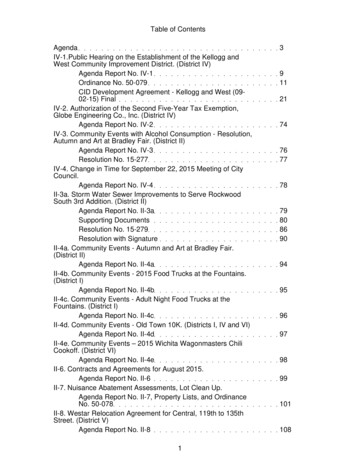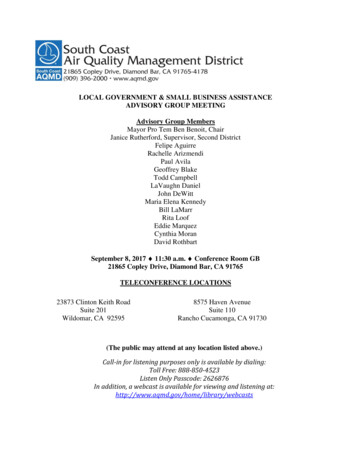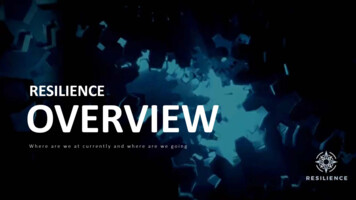
Transcription
The WhyAGENDACurrent status of MRTsHow and where training is offeredFive main effortsBuilding Resilience Community ModelIntegrationTargetedEvaluating
1. THE WHYEVIDENCE BEHIND AIR FORCE RESILIENCE
COMPEHENSIVE AIRMAN tionCommunicationCore veranceAdaptabilityStrengthSocial SupportPerspectivePositive ThinkingRecoveryTeamworkPurpose
RESILIENCEMISSION AND VISIONResilience The ability to withstand, recover and/or grow in the face of stressors and changing demands.Mission Build and sustain a thriving and resilient Air Force Community that fosters mental, physical,social and spiritual fitnessVision A thriving and resilient Air Force Community ready to meet any challenge
2014WhyDefense Centers ofExcellence published 3studies evaluating AFResilience SkillsINCREASEARMYSimilar ResultsPOSITIVE WHILE DECREASINGNEGATIVE BEHAVIORSHIGHERRESILIENCE, MORALE, andPYSCHOLOGICAL HEALTHUnits with MRTs vs. those withoutResilienceDOD services show similar effects; increase in positiveoutcomes, reduction in negative onesMattersNAVYSimilar ResultsLOWERLOWER SUBSTANCE ABUSE DIAGNOSES andMENTAL HEALTH DIAGNOSESUnits with MRTs vs. those without
The EvidencePOSITIVECOPINGPositively associated with problem‐solving,coping, improved relationships, reducedepressive symptoms, and retentionBehindPYSCHOLOGYSupported by 60 evidenced studiesItWELL‐BEINGAssociated with positive outcomes, reductionin negative ones
tyDecision MakingPositive ThinkingReduce StressDecrease AnxietyEnduranceNutritionRecoveryStrengthPrevent BurnoutCommunicationConnectednessSocial SupportTeamworkReduce Depressive SymptomsCore ValuesPerseverancePerspectivePurposeFocus and Attention
2. WHERE WE ARE
RESILIENCE PROGRAMEstablished in 20125.6k200K3Master Resilience TrainersAirmen TrainedCurriculum ChangesTo date there have been 5693 trainedMaster Resilience TrainersApproximately 200K Airmen have been trainedthrough FTAC on the AF Resilience SkillsOver the past 7 years there have been 3curriculum changes
How andWhere it isCurrentlyBeing TrainedBasic MilitaryTrainingApproximately 4 hours are dedicated to learning basic principles of CAFdomains, gratitude, mindfulness, and goal setting. This is done in smallgroup discussions.TechnicalTrainingApproximately 4 hours are dedicated to resilience training covering growthmindset tools as part of developing Airmanship within our enlistedAirmen.First TermAirmanCourse8 hours in a classroom setting is dedicated to teaching 6 foundationalskills: Gratitude, Mindfulness, Re‐Frame, Balance Your Thinking, ValueBased Goal Setting, and Active Constructive Responding.MilitaryTrainingLeader (MTL)CourseFirst SergeantAcademyStudents (MTLs) receive Resilience Training Assistant certification.Students (First Sergeants) receive Resilience Training Assistant Coursecurriculum.
3. WHERE WE WANT TO BE
WHERE WE WANT TO BE40%60%# ACTIVE MRTS# ACTIVE MRTs30%75%INTEGRATED50%INTEGRATED75%TARGETED TOOLKIT MODULES25%TARGETED TOOLKIT MODULES100%RESILIENCE EVALUATION20%RESILIENCE EVALUATION100%CSC RESILIENCE TRACKING PROGRAMCSC RESILIENCE TRACKING PROGRAM
Goal4 IN 5 MRTSACTIVE
nityAirman &FamilyReadinessCenterQuality MilitaryFamily andTeamsLife SkillsProgramsPrograms and Agencies that Support CAF
A F S CA N DK E YL I F E C Y C L ET O U C H P O I N T SEFFORTSThe specialty modules targetsome key life touchpoints thatimpact military members andtheir families. Feedback onwhat works, does not work,and how we can betterintegrate is crucial.There is flexibility forinstallations to tailor modulestargeted to specific AFSCs.We want to take that a stepfurther and have ready to goproduct for our teams. Pleaseshare your targetedapproaches.Continuing to reinforce thefoundational skills taught inBMT, Tech Training, and FTACis critical to optimallydeveloping our Airmen.Targeted modules to lifetouchpoints is key.A1Z, Air University, andResilience Operations aredeveloping tools for leadersand also exploringopportunities to strategicallyplace resilience skills intoprofessional development.
Quality of TrainingRESILIENCEThis is 2 part. Air University continuously measures the quality oftraining at the Master Resilience Trainer Course. ResilienceOperations is partnering with the Air Force Survey Office toimplement a continuous evaluation of resilience skills training atthe installation level for FTAC.EffectivenessCurrently, an evaluation is occurring to measure the quality andeffectiveness of the training. Results will be provided to CSPMS.FeedbackA survey will be posted on the Resilience OperationsSharePoint to collect feedback from CSPMs, CSCs, MRTs, andRTAs about Resilience Skills Training and efforts. Theprojected date for this is 01 Jan 2020. This will assist theteam in future enhancements.
TRACK AND MANAGETRAINER TRACKINGResilience Ops is working with an ITteam to explore automatingMRT/RTA tracking.COURSE TRACKINGETMS is a tool installations can use to offercourses. For more information go to theETMS lt.aspxSHAREPOINTThe Resilience Ops SharePoint hosts a libraryof resources and tools. We encourageinstallations through MAJCOMS to submitinnovative ideas via the SharePoint.
RESILIENCETOPSmall Groups050403Foundational (FTAC)ReinforcersIntegrated0201Resilience Trainers
M A S T E RR E S I L I E N C ET R A I N E RYOUR MRTS01 COMPLETE MRT COURSE02 TEACH IN FTAC03 CONDUCT RTA COURSEThis is a 1 week in residence course. It isoffered throughout the year at AirUniversity. Installations may also submit arequest to host an on site course, thereare requirements for this option and it isbased on availability.The Resilience Skills Training (RST) in FTACis foundational to building ResilientAirmen. It is important for the MRT towork with the CSC to ensure an optimaltraining experience is achieved.RTA courses are 3 days in length thatcomprise of 2 day of skills instruction and1 day of student teach backs. Eachstudent must complete 2 teach backs tocomplete the course.04 KEY SPOUSE & FAMILY05 COMMUNITY RESILIENCE06 ASSIST COMMAND TEAMMRTs assist in training Key Spouses inresilience skills. In addition, they assist inteaching and reinforcing skills amongstfamily members.MRTs work closely with their installationCSC to develop ways to build and enhanceresilience skills amongst variouspopulations assigned to the installation.MRTs serve as a positive asset to the unit.They support commands team asrequested. MRTs are afforded flexibility totailor resilience efforts to fit the needs ofthe unit.
RESILIENCETOPSmall Groups050403Foundational (FTAC)ReinforcersIntegrated0201Resilience Trainers
R E S I L I E N C ECOURSEFTAC Resilience Skills Training is conducted using Air Forceapproved curriculum.8 Hour CourseTaught by MRTRTAs may assistCommunity Support CoordinatorCareer Assistance AdvisorMRT LeadFirst Term AirmanCourseNote: AFRC and ANG Airmen will receive resilience skills familiarization as directed by local leadership
RESILIENCETOPSmall Groups050403Foundational (FTAC)ReinforcersIntegrated0201Resilience Trainers
R E S I L I E N C EGROUPTools are provided to engage in meaningful discussions and areframed to meet the immediate needs of the unit. They are asupplement to formalized training. They are not intended to beconducted in a classroom setting.Complement RST12 Optional Quick GripsGroups of 10 or lessDiscussion Questions15 Minutes or Less
RESILIENCETOPSmall Groups050403Foundational (FTAC)ReinforcersIntegrated0201Resilience Trainers
R E S I L I E N C ESKILLSIntegrating skills into already existing formal and informal effortsand initiatives is a key element to building resilience communities.IntegrationExisting Educational ForumsExisting Forums (e.g.CC/calls)Clubs and GroupsPhysical Training (PT)
RESILIENCETOPSmall Groups050403Foundational (FTAC)ReinforcersIntegrated0201Resilience Trainers
REINFORCERVIDEOSCHUNKING VIGNETTESBite SizeChunksIncreasesMemorization
REINFORCERMARKETINGHIGH QUALITY READY FOR SOCIAL MEDIA or PRINT
WHAT YOU DO MATTERSTHANK YOU
Submit questions toAFPC.DPF.ResilienceOps@us.af.mil
This is 2 part. Air University continuously measures the quality of training at the Master Resilience Trainer Course. Resilience Operations is partnering with the Air Force Survey Office to implement a continuous evaluation of resilience skills training at the installation level for FTAC. Effectiveness
